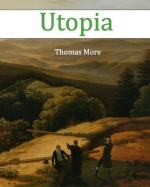to find out rich men for undergoing those employments,
which ought rather to be trusted to the wise.
These laws, I say, might have such effect as good
diet and care might have on a sick man whose recovery
is desperate; they might allay and mitigate the disease,
but it could never be quite healed, nor the body politic
be brought again to a good habit as long as property
remains; and it will fall out, as in a complication
of diseases, that by applying a remedy to one sore
you will provoke another, and that which removes the
one ill symptom produces others, while the strengthening
one part of the body weakens the rest.”
“On the contrary,” answered I, “it
seems to me that men cannot live conveniently where
all things are common. How can there be any
plenty where every man will excuse himself from labour?
for as the hope of gain doth not excite him, so the
confidence that he has in other men’s industry
may make him slothful. If people come to be pinched
with want, and yet cannot dispose of anything as their
own, what can follow upon this but perpetual sedition
and bloodshed, especially when the reverence and authority
due to magistrates falls to the ground? for I cannot
imagine how that can be kept up among those that are
in all things equal to one another.” “I
do not wonder,” said he, “that it appears
so to you, since you have no notion, or at least no
right one, of such a constitution; but if you had
been in Utopia with me, and had seen their laws and
rules, as I did, for the space of five years, in which
I lived among them, and during which time I was so
delighted with them that indeed I should never have
left them if it had not been to make the discovery
of that new world to the Europeans, you would then
confess that you had never seen a people so well constituted
as they.” “You will not easily persuade
me,” said Peter, “that any nation in that
new world is better governed than those among us;
for as our understandings are not worse than theirs,
so our government (if I mistake not) being more ancient,
a long practice has helped us to find out many conveniences
of life, and some happy chances have discovered other
things to us which no man’s understanding could
ever have invented.” “As for the
antiquity either of their government or of ours,”
said he, “you cannot pass a true judgment of
it unless you had read their histories; for, if they
are to be believed, they had towns among them before
these parts were so much as inhabited; and as for
those discoveries that have been either hit on by
chance or made by ingenious men, these might have happened
there as well as here. I do not deny but we
are more ingenious than they are, but they exceed
us much in industry and application. They knew
little concerning us before our arrival among them.
They call us all by a general name of ‘The
nations that lie beyond the equinoctial line;’
for their chronicle mentions a shipwreck that was
made on their coast twelve hundred years ago, and
that some Romans and Egyptians that were in the ship,




